Late on April 21st UK time a report by the BBC’s Paris correspondent Hugh Schofield appeared on the BBC News website’s ‘Middle East’ page under the headline ‘Paris synagogue bomber convicted after 43 years’.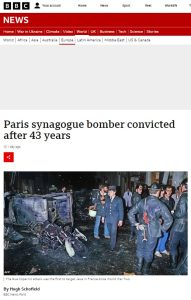
Schofield’s report relates to the sentencing in absentia of Lebanese-Canadian Hassan Diab to life in prison for the 1980 bombing of a synagogue in Paris in which four people – including an Israeli journalist – were killed.
Schofield’s account of that terror attack and the subsequent legal proceedings includes some interesting language. Readers are told that: [emphasis added]
“The Rue Copernic attack was the first to target Jews in France since World War Two, and became a template for many other similar attacks linked to militants in the Middle East in the years that followed.”
However just five paragraphs later it is evident that Schofield is fully aware of the fact that the bombing of the synagogue during the Simchat Torah festival was a terror attack:
“Finally in 2021 an appeal against the closure of the case was upheld in the Supreme Court, the first time this had ever happened in a French terrorism case.”
Even more curious is Schofield’s portrayal of the organisation responsible for the attack:
“The bomber was identified as having a fake Cypriot passport bearing the name Alexander Panadriyu.
He was believed to have entered France from another European country as part of a larger group, and to have bought the motorbike at a shop near the Arc de Triomphe.
He was thought to belong to a dissident Palestinian group called the Popular Front for the Liberation of Palestine-Special Operations (PFLP-SO).”
The same description appears in a photo caption:
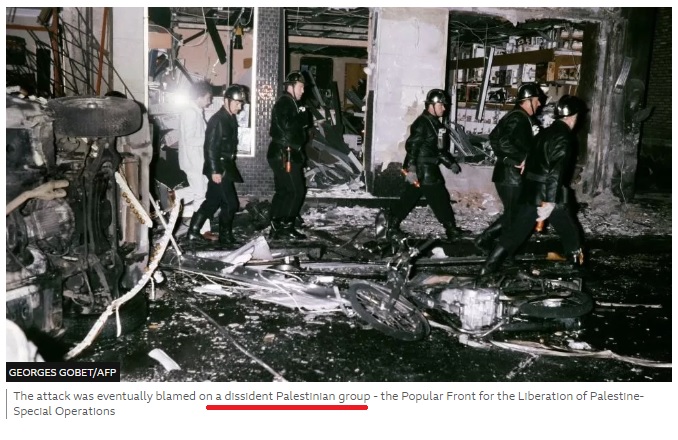
The reason for Schofield’s use of the word “dissident” is unclear, with no explanation provided as to what that “Palestinian group” supposedly disagreed with or opposed.
As noted by Jonathan Spyer in an article about the Entebbe hijacking that was perpetrated by the same group – which is also known as the Popular Front for the Liberation of Palestine – External Operations (PFLP-EO):
“The PFLP-EO, led by Dr. Wadie Haddad, is sometimes described as an “offshoot” or “splinter” from the more well-known Popular Front for the Liberation of Palestine (PFLP). Haddad, a Palestinian Christian born in Safed in 1927, was a close associate of PFLP founder George Habash. Both were medical doctors and graduates of the American University of Beirut. When Habash founded the PFLP following the Six Day War in 1967, Haddad became the leader of its military wing. In the subsequent years, he led a number of high-profile attacks on Israeli and Jordanian targets, including the Dawsons’ Field Hijackings of September 1970, and the hijacking of an El Al plane in 1968.
A number of accounts sympathetic to the PFLP claim that at some point in the early 1970s, Wadie Haddad was expelled from the organization and then continued to operate in the field of international terrorism, using the name PFLP-EO. The reason cited for his supposed expulsion is the negative effect of the Dawsons’ Field events on the Palestinians’ position in Jordan.
The motives for this claim are fairly obvious. The PFLP was and remains an integral part of the PLO. The PLO in turn was and is engaged in international diplomacy and formal political activity. Open association with an organization that engaged in the deliberate targeting of civilians and civil aviation, the singling out of Jews as victims and association with antisemitic German terrorists would not be conducive to success in these endeavors.
No proof has ever been presented for the supposed ‘expulsion’ of Wadie Haddad from the PFLP. Rather, all evidence suggests that the PFLP-EO was a conveniently deniable front for the PFLP itself. […]
Documents of the USSR’s Committee of State Security, better known as the KGB, secretly translated from the KGB archive by Soviet dissident Vladimir Bukovsky in 1992, further support the contention that any distinction between the PFLP and Haddad’s organization is bogus.
In a document dated April 23, 1974, then-KGB head Yuri Andropov describes Haddad as “Politburo member of the Popular Front for the Liberation of Palestine (PFLP), head of the PFLP’s external operations section.””
Schofield however made no effort to provide BBC audiences with any background information concerning the PFLP-SO, its record of terror attacks and its connection to the PFLP. Not only is that context important for understanding of the story that is the topic of his report but the failure to include it also clouds audience understanding of contemporary BBC coverage of PFLP related stories.
Related Articles:
WHAT HAS CHANGED IN 50 YEARS OF BBC REPORTING ON A PFLP HIJACKING?

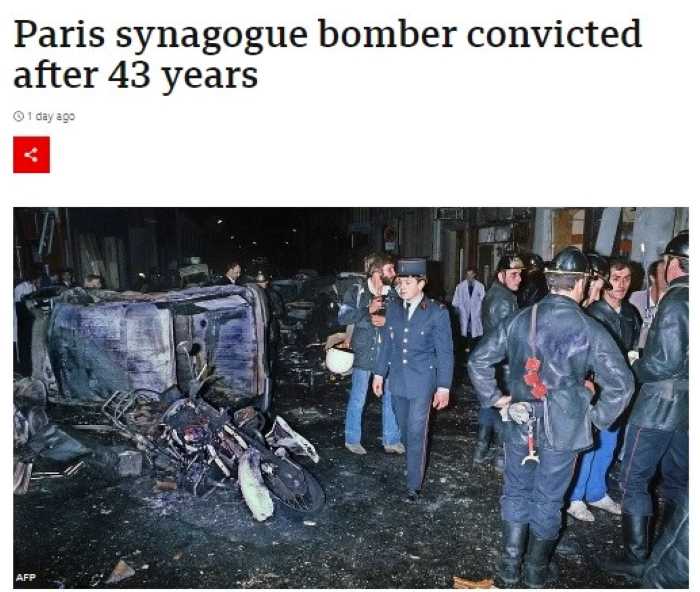
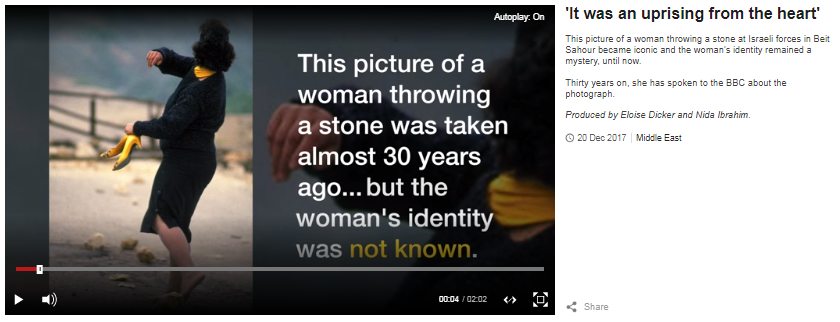

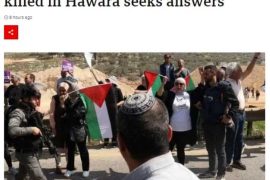

Anybody expecting a truthful or accurate report from the BBC is disillusioned and needs to transfer their information source to a medium that has not been infiltrated by arabists.